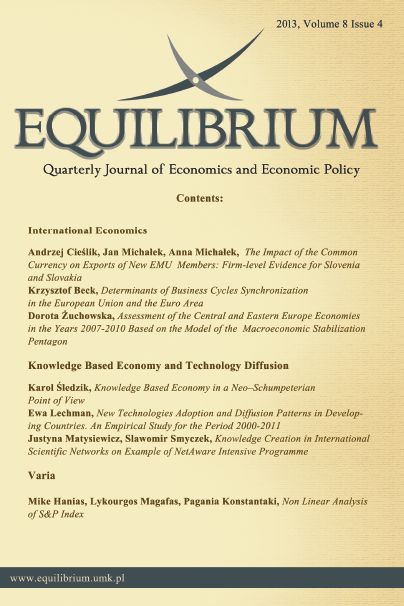Knowledge Creation in International Scientific Networks on Example of NetAware Intensive Programme
DOI:
https://doi.org/10.12775/EQUIL.2013.029Keywords:
knowledge creation, knowledge transfer, collaborative project, educationAbstract
The knowledge-based economy analyzes economic organization and development when the creation, distribution and use of knowledge become decisive factors. To become a successful knowledge economies, countries must act simultaneously on their education base, their innovation systems and their information and communication technology infrastructure, while also building a high-quality economic and institutional regime. The institutions for higher education are the main figures for the successful transition to a knowledge based economy and society. Their cooperation activities with the neighboring countries and the countries within their wider vicinity are an important priority for breaking the university isolation from what happens in the civil society, as well as the other structural problems, like the outdated curricula and skills of teachers. This paper focuses on international scientific networks as an example of tool created in order to stimulate the use of new knowledge. The main objective of the paper is to identify: 1) the knowledge creation and transfer processes in ISC 2) influence of that processes on the participants of the ISC. The methodology utilized in this study is qualitative and exploratory. Re- sults of research shows the process of knowledge creation and transfer on the example of NetAware Intensive Programme and the project evaluation results.
Downloads
References
Robertson S. (2009), Education, Knowledge and Innovation in the Global Economy: Challenges and Future Directions, ?Keynote Address to Launch Research Centres?, VIA University College, Aarhus, Denmark.
Yu-chu Yeh (2010), Knowledge Management and Professional Development in Creativity Instruction, http://www.ccis.nccu.edu.tw/sites/default/files/CCISEJ0011_ 0.pdf (05.06.2013).
Amin A. Roberts J. (2008) Knowing in action: beyond communities of practice, ?Research Policy? Vol. 37, No. 2, http://dx.doi.org/10.1016/j.respol. 2007.11.003.
Arrow K.J. (1962), The economic implications of learning by doing, ? Review of Economic Studies?, Vol. 29, http://dx.doi.org/10.2307/2295952.
Barnes T., Pashby I., Gibbons A. (2002), Effective University-Industry Interaction : A Multi-Case Evaluation of Collaborative RandD Projects, ?European Management Journal?, Vol. 20, No. 3.
Charles D.,Howells J. (1992), Technology transfer in Europe. Public and private networks. Belhaven Press, London.
Coromina Soler L. (2006), Social networks and performance in knowledge creation. An application and methodological proposal, doctoral dissertation, Department of Economics, University of Girona, Girona.
Davenport S., Davies J., Grimes C. (1999), Collaborative research programmes: building trust from difference, ? Technovation?, Vol. 19.
Engelbrecht H.-J. (2009), Natural capital, subjective well-being, and the New Welfare Economics of sustainability: some evidence from cross-country regressions, ?Ecological Economics?, Vol. 69, No. 2, http://dx.doi.org/10.1016/j.ecol econ.2009.08.011.
Etkowitz H., Andrew W. (1998), Entrepreneurial Science: The Second Academic Revolution [in:] H. Etkowitz, A. Webster, P. Healey (ed.), Capitalizing Knowledge: New Intersections in Industry and Academia, New York: SUNY Press, http://dx.doi.org/10.1109/44.948843.
Etzkowitz H., Leydesdorff L. (2000), The dynamic of innovation: from National Systems and "Mode 2" to triple Helix of university-industry-government relations, ?Research Policy?, Vol.29, http://dx.doi.org/10.1016/S0048- 7333(99)00055-4.
European Commission (2000), Trends in European innovation policy and the climate for innovation in the Union, ?ECWorking Paper SEC?, Vol. 1564.
Hagel J., Brown J.S., Davison L. (2010), The power of pull: how small moves, smartly made, can set big things in motion, New York, Basic Books.
Hautala J. (2011), Academic Knowledge Creation As A Spatio-Temporal Process The case of international research groups in Finland, ?Acta Universitatis Ouluensis, A Scientiae RerumNaturalium?, Vol. 584.
Hermans J., Castiaux A. (2007), Knowledge Creation through University-Industry Collaborative Research Projects, ?The Electronic Journal of Knowledge Management?, Vol. 5, No. 1, www.ejkm.com (21.05.2013).
Karagiannis S. (2007), The Knowledge-Based Economy, Convergence and Economic Growth: Evidence from the European Union, ?Centre of Planning And Economic Research? No 91.
Katz J.S., Martin B.R. (1997), What is research collaboration, ?Research Policy?, Vol. 26, http://dx.doi.org/10.1016/S0048-7333(96)00917-1.
Landry R., Amara N. (1998), The impact of transaction costs on the institutional structuration of collaborative academic research, ?Research Policy?, Vol.27, No. 9, http://dx.doi.org/10.1016/S0048-7333(98)00098-5.
Nonaka I, Takeuchi H. (1996), The knowledge creating company:How japanese comapanies create the dynamics of innowvation,? Longe range Planning?, Vol. 26, No. 4, http://dx.doi.org/10.1016/0024-6301(96)81509-3.
Nonaka I. (1991), The knowledge creating company, ?Harvard Business Review?, Vol. 69, No. 6.
OCDE (2003), Promoting Better Public-Private Partnerships: Industry-University Relations, ?Business and Industry Advisory Committee to the OECD papers?.
Rogers E. (1983), The Diffusion of Innovation, The Free Press, New York, NY.
Rolin K. (2008), Science as collective knowledge, ?Cognitive Systems Research?, Vol. 9, No. 1-2, http://dx.doi.org/10.1016/j.cogsys.2007.07.007.
Romer P. (1989), Human Capital and Growth: Theory and Evidence, ?NBER Working Paper?, Cambridge, Massachusetts.
Salas N., Cooke N., Rosen M. (2008), On teams, teamwork, and team performance: discoveries and developments. Human Factors, ?Human Factors: The Journal of the Human Factors and Ergonomics Society ? Vol. 50, No. 3, http://dx.doi.org/10.1518/001872008X288457.
Siadat S.A., Hoveida R.(2012), Knowledge creation in universities and some related factors, ?Journal of Management Development?, Vol. 31 No. 8, http://dx.doi.org/10.1108%2F02621711211253286.
Schartinger D., Rammer C., Fischer M.M., Frolhlich J. (2002), Knowledge interactions between universities and industry in Austria: sectoral pattern and determinants, ?Research Policy?, Vol. 31, http://dx.doi.org/10.1016/S0048- 7333(01)00111-1.
Singh J., Fleming L. (2010), Lone inventors as sources of breakthroughs: myth or reality?, ?Management Science? Vol. 56, No. 1, http://dx.doi.org/ 10.1287%2Fmnsc.1090.1072.
Sveiby K.E. (2001), A Knowledge-Based Theory of the Firm for Strategy Formation, ?Journal of Intellectual Capital?, Vol. 2, No. 4.
van Geenhuizen M.P., Nijkamp H.R. (1997), Universities and knowledge-based economic growth: the case of Delft (NL), ?GeoJournal? Vol. 41, No. 4.
Van Looy B., Callaert J. Debackere K. (2006), Publication and patent behavior of academic researchers: Conflicting, reinforcing or merely co-existing?. ?Research Policy?, Vol. 35.
Varga A., Parag A. (2008), Academic Knowledge Transfers and Structure of International Research Networks, No. 2, ?Working Papers from University of Pécs?, Department of Economics and Regional Studies.
Wolfe D.A. (2005), Innovation and Research Funding: The Role of Government Support [in:] F. Iacobucci, C. Tuohy (ed.), Taking Public Universities Seriously, Toronto: Univesity of Toronto.






